Challenges and Opportunities in Nigerian Distant Learning Education
VerifiedAdded on 2019/09/23
|11
|4779
|309
Report
AI Summary
The assignment content discusses the challenges and opportunities in Nigerian distant learning education. It highlights that despite the potential of distance learning to increase access to education, Nigerian students are facing significant challenges due to economic, political, and technological limitations. The report also emphasizes the need for adequate funding, investment in technology infrastructure, staff training, computer literacy, and a perfect synergy among distance learning institutions. The conclusion emphasizes the importance of involving every stakeholder, including the government, in policy-making and implementing reforms to address these challenges.
Contribute Materials
Your contribution can guide someone’s learning journey. Share your
documents today.
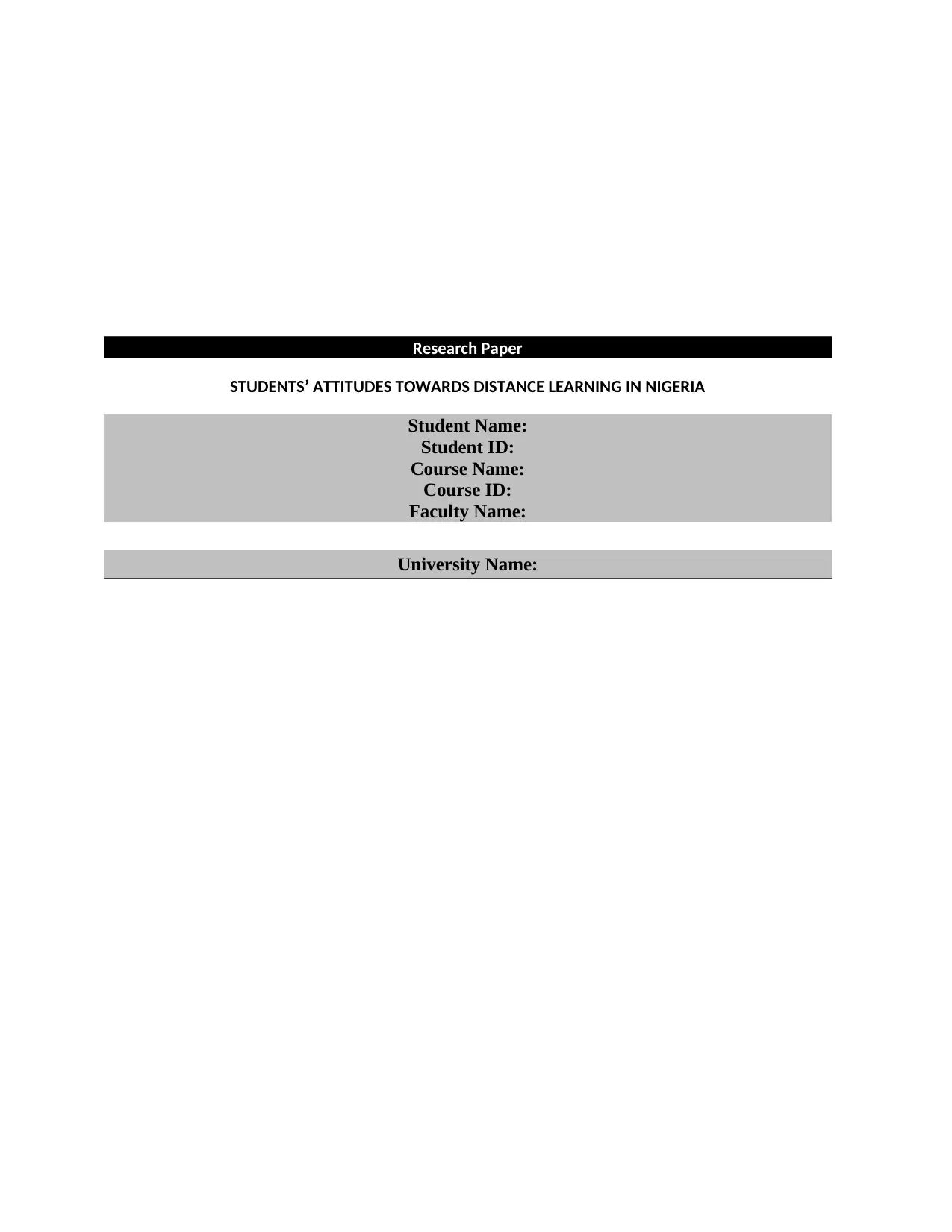
Research Paper
STUDENTS’ ATTITUDES TOWARDS DISTANCE LEARNING IN NIGERIA
Student Name:
Student ID:
Course Name:
Course ID:
Faculty Name:
University Name:
STUDENTS’ ATTITUDES TOWARDS DISTANCE LEARNING IN NIGERIA
Student Name:
Student ID:
Course Name:
Course ID:
Faculty Name:
University Name:
Secure Best Marks with AI Grader
Need help grading? Try our AI Grader for instant feedback on your assignments.
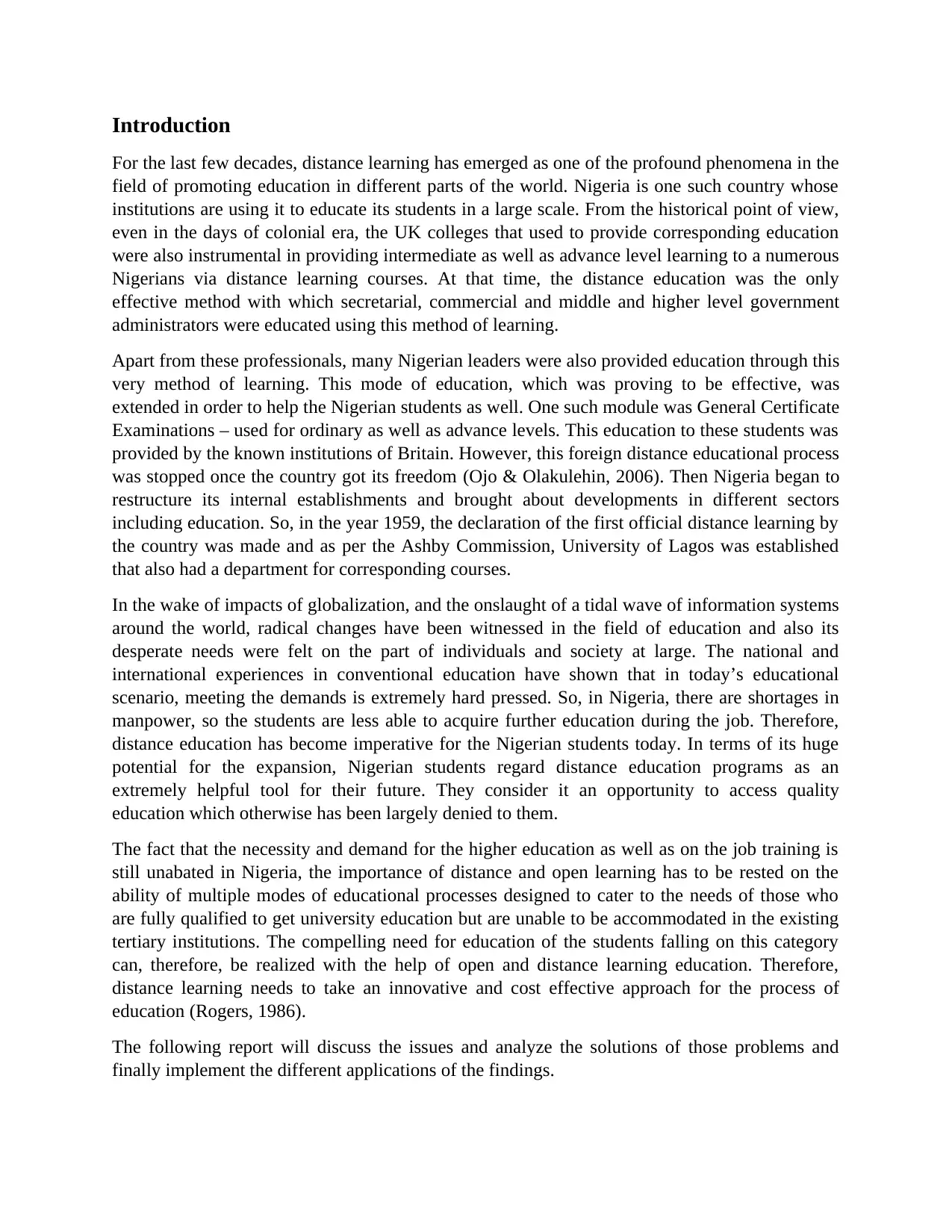
Introduction
For the last few decades, distance learning has emerged as one of the profound phenomena in the
field of promoting education in different parts of the world. Nigeria is one such country whose
institutions are using it to educate its students in a large scale. From the historical point of view,
even in the days of colonial era, the UK colleges that used to provide corresponding education
were also instrumental in providing intermediate as well as advance level learning to a numerous
Nigerians via distance learning courses. At that time, the distance education was the only
effective method with which secretarial, commercial and middle and higher level government
administrators were educated using this method of learning.
Apart from these professionals, many Nigerian leaders were also provided education through this
very method of learning. This mode of education, which was proving to be effective, was
extended in order to help the Nigerian students as well. One such module was General Certificate
Examinations – used for ordinary as well as advance levels. This education to these students was
provided by the known institutions of Britain. However, this foreign distance educational process
was stopped once the country got its freedom (Ojo & Olakulehin, 2006). Then Nigeria began to
restructure its internal establishments and brought about developments in different sectors
including education. So, in the year 1959, the declaration of the first official distance learning by
the country was made and as per the Ashby Commission, University of Lagos was established
that also had a department for corresponding courses.
In the wake of impacts of globalization, and the onslaught of a tidal wave of information systems
around the world, radical changes have been witnessed in the field of education and also its
desperate needs were felt on the part of individuals and society at large. The national and
international experiences in conventional education have shown that in today’s educational
scenario, meeting the demands is extremely hard pressed. So, in Nigeria, there are shortages in
manpower, so the students are less able to acquire further education during the job. Therefore,
distance education has become imperative for the Nigerian students today. In terms of its huge
potential for the expansion, Nigerian students regard distance education programs as an
extremely helpful tool for their future. They consider it an opportunity to access quality
education which otherwise has been largely denied to them.
The fact that the necessity and demand for the higher education as well as on the job training is
still unabated in Nigeria, the importance of distance and open learning has to be rested on the
ability of multiple modes of educational processes designed to cater to the needs of those who
are fully qualified to get university education but are unable to be accommodated in the existing
tertiary institutions. The compelling need for education of the students falling on this category
can, therefore, be realized with the help of open and distance learning education. Therefore,
distance learning needs to take an innovative and cost effective approach for the process of
education (Rogers, 1986).
The following report will discuss the issues and analyze the solutions of those problems and
finally implement the different applications of the findings.
For the last few decades, distance learning has emerged as one of the profound phenomena in the
field of promoting education in different parts of the world. Nigeria is one such country whose
institutions are using it to educate its students in a large scale. From the historical point of view,
even in the days of colonial era, the UK colleges that used to provide corresponding education
were also instrumental in providing intermediate as well as advance level learning to a numerous
Nigerians via distance learning courses. At that time, the distance education was the only
effective method with which secretarial, commercial and middle and higher level government
administrators were educated using this method of learning.
Apart from these professionals, many Nigerian leaders were also provided education through this
very method of learning. This mode of education, which was proving to be effective, was
extended in order to help the Nigerian students as well. One such module was General Certificate
Examinations – used for ordinary as well as advance levels. This education to these students was
provided by the known institutions of Britain. However, this foreign distance educational process
was stopped once the country got its freedom (Ojo & Olakulehin, 2006). Then Nigeria began to
restructure its internal establishments and brought about developments in different sectors
including education. So, in the year 1959, the declaration of the first official distance learning by
the country was made and as per the Ashby Commission, University of Lagos was established
that also had a department for corresponding courses.
In the wake of impacts of globalization, and the onslaught of a tidal wave of information systems
around the world, radical changes have been witnessed in the field of education and also its
desperate needs were felt on the part of individuals and society at large. The national and
international experiences in conventional education have shown that in today’s educational
scenario, meeting the demands is extremely hard pressed. So, in Nigeria, there are shortages in
manpower, so the students are less able to acquire further education during the job. Therefore,
distance education has become imperative for the Nigerian students today. In terms of its huge
potential for the expansion, Nigerian students regard distance education programs as an
extremely helpful tool for their future. They consider it an opportunity to access quality
education which otherwise has been largely denied to them.
The fact that the necessity and demand for the higher education as well as on the job training is
still unabated in Nigeria, the importance of distance and open learning has to be rested on the
ability of multiple modes of educational processes designed to cater to the needs of those who
are fully qualified to get university education but are unable to be accommodated in the existing
tertiary institutions. The compelling need for education of the students falling on this category
can, therefore, be realized with the help of open and distance learning education. Therefore,
distance learning needs to take an innovative and cost effective approach for the process of
education (Rogers, 1986).
The following report will discuss the issues and analyze the solutions of those problems and
finally implement the different applications of the findings.
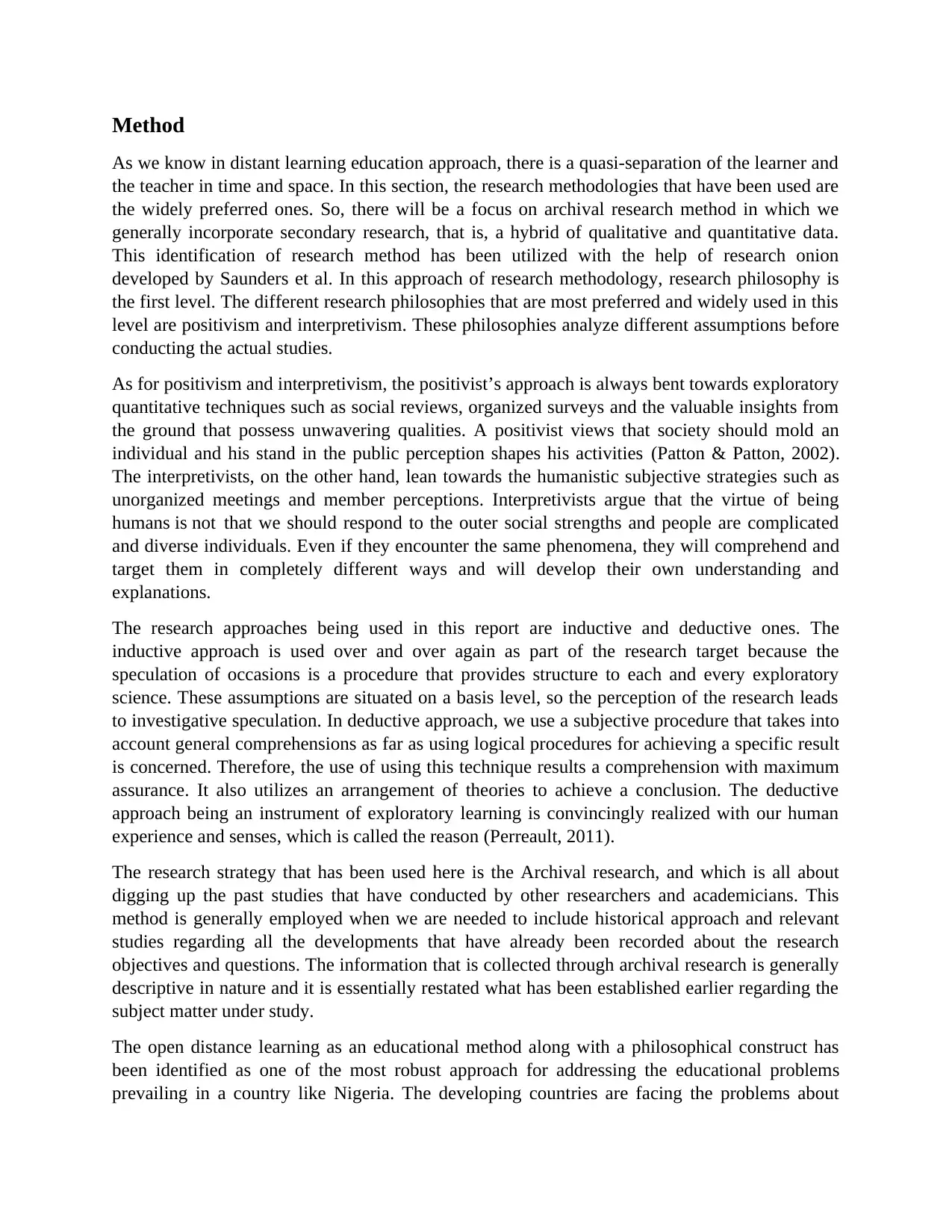
Method
As we know in distant learning education approach, there is a quasi-separation of the learner and
the teacher in time and space. In this section, the research methodologies that have been used are
the widely preferred ones. So, there will be a focus on archival research method in which we
generally incorporate secondary research, that is, a hybrid of qualitative and quantitative data.
This identification of research method has been utilized with the help of research onion
developed by Saunders et al. In this approach of research methodology, research philosophy is
the first level. The different research philosophies that are most preferred and widely used in this
level are positivism and interpretivism. These philosophies analyze different assumptions before
conducting the actual studies.
As for positivism and interpretivism, the positivist’s approach is always bent towards exploratory
quantitative techniques such as social reviews, organized surveys and the valuable insights from
the ground that possess unwavering qualities. A positivist views that society should mold an
individual and his stand in the public perception shapes his activities (Patton & Patton, 2002).
The interpretivists, on the other hand, lean towards the humanistic subjective strategies such as
unorganized meetings and member perceptions. Interpretivists argue that the virtue of being
humans is not that we should respond to the outer social strengths and people are complicated
and diverse individuals. Even if they encounter the same phenomena, they will comprehend and
target them in completely different ways and will develop their own understanding and
explanations.
The research approaches being used in this report are inductive and deductive ones. The
inductive approach is used over and over again as part of the research target because the
speculation of occasions is a procedure that provides structure to each and every exploratory
science. These assumptions are situated on a basis level, so the perception of the research leads
to investigative speculation. In deductive approach, we use a subjective procedure that takes into
account general comprehensions as far as using logical procedures for achieving a specific result
is concerned. Therefore, the use of using this technique results a comprehension with maximum
assurance. It also utilizes an arrangement of theories to achieve a conclusion. The deductive
approach being an instrument of exploratory learning is convincingly realized with our human
experience and senses, which is called the reason (Perreault, 2011).
The research strategy that has been used here is the Archival research, and which is all about
digging up the past studies that have conducted by other researchers and academicians. This
method is generally employed when we are needed to include historical approach and relevant
studies regarding all the developments that have already been recorded about the research
objectives and questions. The information that is collected through archival research is generally
descriptive in nature and it is essentially restated what has been established earlier regarding the
subject matter under study.
The open distance learning as an educational method along with a philosophical construct has
been identified as one of the most robust approach for addressing the educational problems
prevailing in a country like Nigeria. The developing countries are facing the problems about
As we know in distant learning education approach, there is a quasi-separation of the learner and
the teacher in time and space. In this section, the research methodologies that have been used are
the widely preferred ones. So, there will be a focus on archival research method in which we
generally incorporate secondary research, that is, a hybrid of qualitative and quantitative data.
This identification of research method has been utilized with the help of research onion
developed by Saunders et al. In this approach of research methodology, research philosophy is
the first level. The different research philosophies that are most preferred and widely used in this
level are positivism and interpretivism. These philosophies analyze different assumptions before
conducting the actual studies.
As for positivism and interpretivism, the positivist’s approach is always bent towards exploratory
quantitative techniques such as social reviews, organized surveys and the valuable insights from
the ground that possess unwavering qualities. A positivist views that society should mold an
individual and his stand in the public perception shapes his activities (Patton & Patton, 2002).
The interpretivists, on the other hand, lean towards the humanistic subjective strategies such as
unorganized meetings and member perceptions. Interpretivists argue that the virtue of being
humans is not that we should respond to the outer social strengths and people are complicated
and diverse individuals. Even if they encounter the same phenomena, they will comprehend and
target them in completely different ways and will develop their own understanding and
explanations.
The research approaches being used in this report are inductive and deductive ones. The
inductive approach is used over and over again as part of the research target because the
speculation of occasions is a procedure that provides structure to each and every exploratory
science. These assumptions are situated on a basis level, so the perception of the research leads
to investigative speculation. In deductive approach, we use a subjective procedure that takes into
account general comprehensions as far as using logical procedures for achieving a specific result
is concerned. Therefore, the use of using this technique results a comprehension with maximum
assurance. It also utilizes an arrangement of theories to achieve a conclusion. The deductive
approach being an instrument of exploratory learning is convincingly realized with our human
experience and senses, which is called the reason (Perreault, 2011).
The research strategy that has been used here is the Archival research, and which is all about
digging up the past studies that have conducted by other researchers and academicians. This
method is generally employed when we are needed to include historical approach and relevant
studies regarding all the developments that have already been recorded about the research
objectives and questions. The information that is collected through archival research is generally
descriptive in nature and it is essentially restated what has been established earlier regarding the
subject matter under study.
The open distance learning as an educational method along with a philosophical construct has
been identified as one of the most robust approach for addressing the educational problems
prevailing in a country like Nigeria. The developing countries are facing the problems about
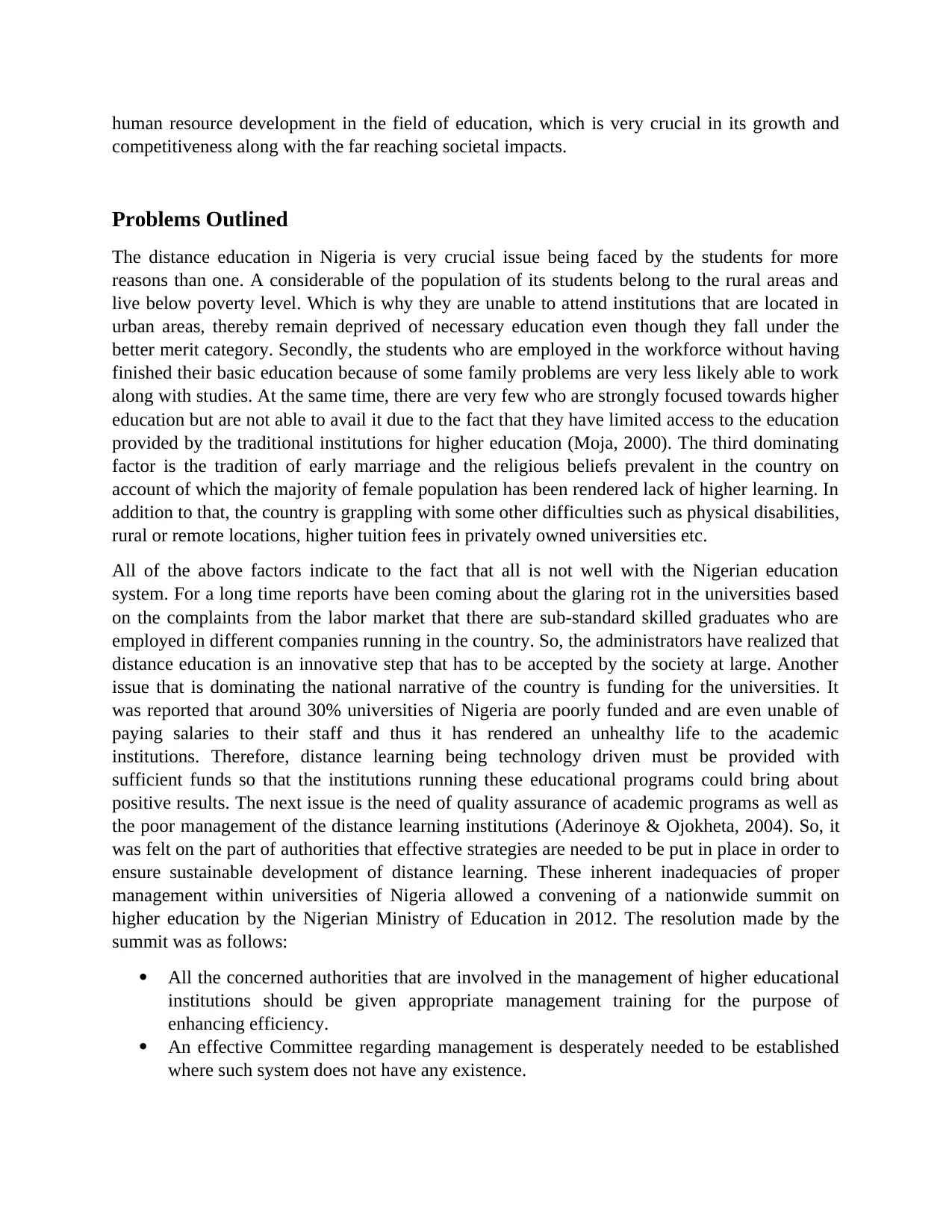
human resource development in the field of education, which is very crucial in its growth and
competitiveness along with the far reaching societal impacts.
Problems Outlined
The distance education in Nigeria is very crucial issue being faced by the students for more
reasons than one. A considerable of the population of its students belong to the rural areas and
live below poverty level. Which is why they are unable to attend institutions that are located in
urban areas, thereby remain deprived of necessary education even though they fall under the
better merit category. Secondly, the students who are employed in the workforce without having
finished their basic education because of some family problems are very less likely able to work
along with studies. At the same time, there are very few who are strongly focused towards higher
education but are not able to avail it due to the fact that they have limited access to the education
provided by the traditional institutions for higher education (Moja, 2000). The third dominating
factor is the tradition of early marriage and the religious beliefs prevalent in the country on
account of which the majority of female population has been rendered lack of higher learning. In
addition to that, the country is grappling with some other difficulties such as physical disabilities,
rural or remote locations, higher tuition fees in privately owned universities etc.
All of the above factors indicate to the fact that all is not well with the Nigerian education
system. For a long time reports have been coming about the glaring rot in the universities based
on the complaints from the labor market that there are sub-standard skilled graduates who are
employed in different companies running in the country. So, the administrators have realized that
distance education is an innovative step that has to be accepted by the society at large. Another
issue that is dominating the national narrative of the country is funding for the universities. It
was reported that around 30% universities of Nigeria are poorly funded and are even unable of
paying salaries to their staff and thus it has rendered an unhealthy life to the academic
institutions. Therefore, distance learning being technology driven must be provided with
sufficient funds so that the institutions running these educational programs could bring about
positive results. The next issue is the need of quality assurance of academic programs as well as
the poor management of the distance learning institutions (Aderinoye & Ojokheta, 2004). So, it
was felt on the part of authorities that effective strategies are needed to be put in place in order to
ensure sustainable development of distance learning. These inherent inadequacies of proper
management within universities of Nigeria allowed a convening of a nationwide summit on
higher education by the Nigerian Ministry of Education in 2012. The resolution made by the
summit was as follows:
All the concerned authorities that are involved in the management of higher educational
institutions should be given appropriate management training for the purpose of
enhancing efficiency.
An effective Committee regarding management is desperately needed to be established
where such system does not have any existence.
competitiveness along with the far reaching societal impacts.
Problems Outlined
The distance education in Nigeria is very crucial issue being faced by the students for more
reasons than one. A considerable of the population of its students belong to the rural areas and
live below poverty level. Which is why they are unable to attend institutions that are located in
urban areas, thereby remain deprived of necessary education even though they fall under the
better merit category. Secondly, the students who are employed in the workforce without having
finished their basic education because of some family problems are very less likely able to work
along with studies. At the same time, there are very few who are strongly focused towards higher
education but are not able to avail it due to the fact that they have limited access to the education
provided by the traditional institutions for higher education (Moja, 2000). The third dominating
factor is the tradition of early marriage and the religious beliefs prevalent in the country on
account of which the majority of female population has been rendered lack of higher learning. In
addition to that, the country is grappling with some other difficulties such as physical disabilities,
rural or remote locations, higher tuition fees in privately owned universities etc.
All of the above factors indicate to the fact that all is not well with the Nigerian education
system. For a long time reports have been coming about the glaring rot in the universities based
on the complaints from the labor market that there are sub-standard skilled graduates who are
employed in different companies running in the country. So, the administrators have realized that
distance education is an innovative step that has to be accepted by the society at large. Another
issue that is dominating the national narrative of the country is funding for the universities. It
was reported that around 30% universities of Nigeria are poorly funded and are even unable of
paying salaries to their staff and thus it has rendered an unhealthy life to the academic
institutions. Therefore, distance learning being technology driven must be provided with
sufficient funds so that the institutions running these educational programs could bring about
positive results. The next issue is the need of quality assurance of academic programs as well as
the poor management of the distance learning institutions (Aderinoye & Ojokheta, 2004). So, it
was felt on the part of authorities that effective strategies are needed to be put in place in order to
ensure sustainable development of distance learning. These inherent inadequacies of proper
management within universities of Nigeria allowed a convening of a nationwide summit on
higher education by the Nigerian Ministry of Education in 2012. The resolution made by the
summit was as follows:
All the concerned authorities that are involved in the management of higher educational
institutions should be given appropriate management training for the purpose of
enhancing efficiency.
An effective Committee regarding management is desperately needed to be established
where such system does not have any existence.
Paraphrase This Document
Need a fresh take? Get an instant paraphrase of this document with our AI Paraphraser
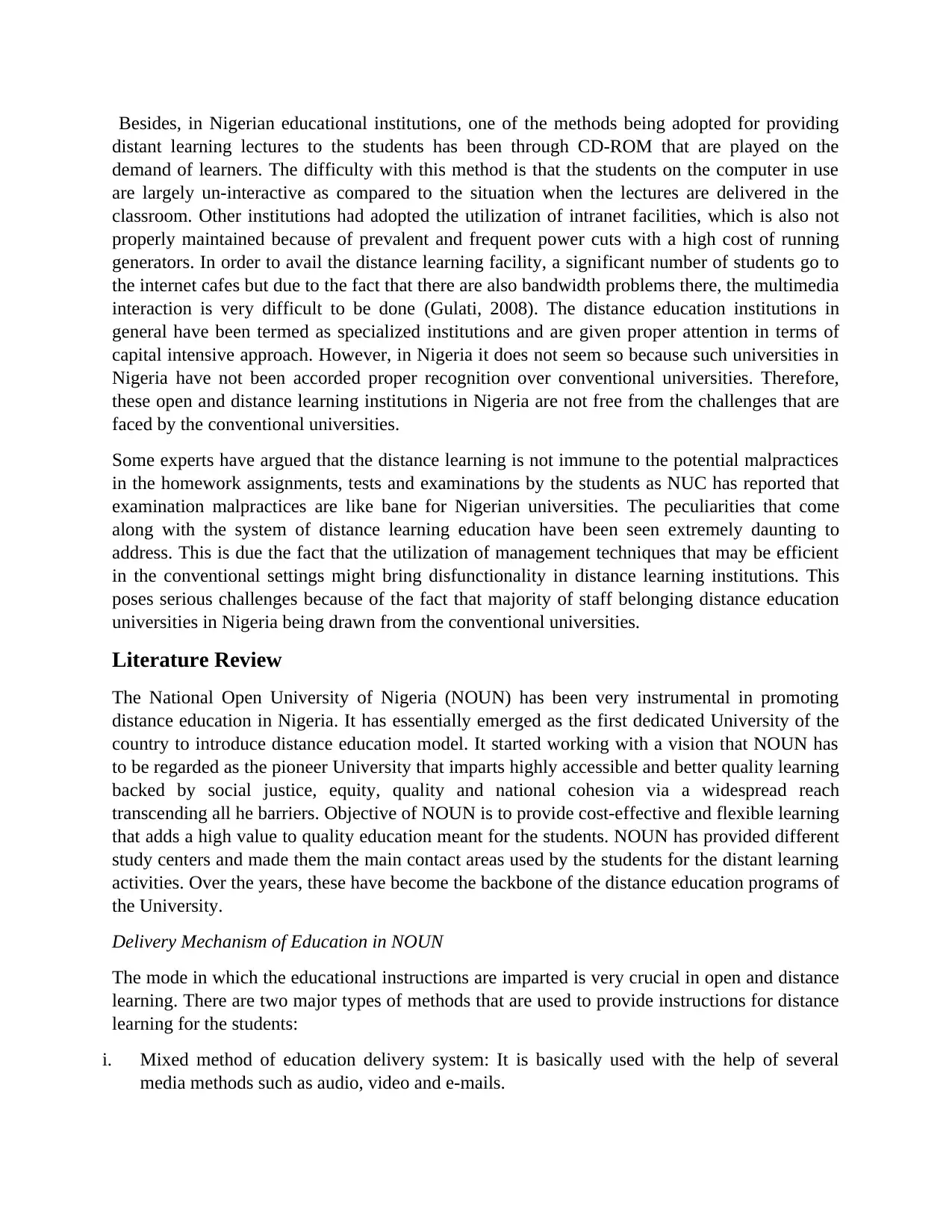
Besides, in Nigerian educational institutions, one of the methods being adopted for providing
distant learning lectures to the students has been through CD-ROM that are played on the
demand of learners. The difficulty with this method is that the students on the computer in use
are largely un-interactive as compared to the situation when the lectures are delivered in the
classroom. Other institutions had adopted the utilization of intranet facilities, which is also not
properly maintained because of prevalent and frequent power cuts with a high cost of running
generators. In order to avail the distance learning facility, a significant number of students go to
the internet cafes but due to the fact that there are also bandwidth problems there, the multimedia
interaction is very difficult to be done (Gulati, 2008). The distance education institutions in
general have been termed as specialized institutions and are given proper attention in terms of
capital intensive approach. However, in Nigeria it does not seem so because such universities in
Nigeria have not been accorded proper recognition over conventional universities. Therefore,
these open and distance learning institutions in Nigeria are not free from the challenges that are
faced by the conventional universities.
Some experts have argued that the distance learning is not immune to the potential malpractices
in the homework assignments, tests and examinations by the students as NUC has reported that
examination malpractices are like bane for Nigerian universities. The peculiarities that come
along with the system of distance learning education have been seen extremely daunting to
address. This is due the fact that the utilization of management techniques that may be efficient
in the conventional settings might bring disfunctionality in distance learning institutions. This
poses serious challenges because of the fact that majority of staff belonging distance education
universities in Nigeria being drawn from the conventional universities.
Literature Review
The National Open University of Nigeria (NOUN) has been very instrumental in promoting
distance education in Nigeria. It has essentially emerged as the first dedicated University of the
country to introduce distance education model. It started working with a vision that NOUN has
to be regarded as the pioneer University that imparts highly accessible and better quality learning
backed by social justice, equity, quality and national cohesion via a widespread reach
transcending all he barriers. Objective of NOUN is to provide cost-effective and flexible learning
that adds a high value to quality education meant for the students. NOUN has provided different
study centers and made them the main contact areas used by the students for the distant learning
activities. Over the years, these have become the backbone of the distance education programs of
the University.
Delivery Mechanism of Education in NOUN
The mode in which the educational instructions are imparted is very crucial in open and distance
learning. There are two major types of methods that are used to provide instructions for distance
learning for the students:
i. Mixed method of education delivery system: It is basically used with the help of several
media methods such as audio, video and e-mails.
distant learning lectures to the students has been through CD-ROM that are played on the
demand of learners. The difficulty with this method is that the students on the computer in use
are largely un-interactive as compared to the situation when the lectures are delivered in the
classroom. Other institutions had adopted the utilization of intranet facilities, which is also not
properly maintained because of prevalent and frequent power cuts with a high cost of running
generators. In order to avail the distance learning facility, a significant number of students go to
the internet cafes but due to the fact that there are also bandwidth problems there, the multimedia
interaction is very difficult to be done (Gulati, 2008). The distance education institutions in
general have been termed as specialized institutions and are given proper attention in terms of
capital intensive approach. However, in Nigeria it does not seem so because such universities in
Nigeria have not been accorded proper recognition over conventional universities. Therefore,
these open and distance learning institutions in Nigeria are not free from the challenges that are
faced by the conventional universities.
Some experts have argued that the distance learning is not immune to the potential malpractices
in the homework assignments, tests and examinations by the students as NUC has reported that
examination malpractices are like bane for Nigerian universities. The peculiarities that come
along with the system of distance learning education have been seen extremely daunting to
address. This is due the fact that the utilization of management techniques that may be efficient
in the conventional settings might bring disfunctionality in distance learning institutions. This
poses serious challenges because of the fact that majority of staff belonging distance education
universities in Nigeria being drawn from the conventional universities.
Literature Review
The National Open University of Nigeria (NOUN) has been very instrumental in promoting
distance education in Nigeria. It has essentially emerged as the first dedicated University of the
country to introduce distance education model. It started working with a vision that NOUN has
to be regarded as the pioneer University that imparts highly accessible and better quality learning
backed by social justice, equity, quality and national cohesion via a widespread reach
transcending all he barriers. Objective of NOUN is to provide cost-effective and flexible learning
that adds a high value to quality education meant for the students. NOUN has provided different
study centers and made them the main contact areas used by the students for the distant learning
activities. Over the years, these have become the backbone of the distance education programs of
the University.
Delivery Mechanism of Education in NOUN
The mode in which the educational instructions are imparted is very crucial in open and distance
learning. There are two major types of methods that are used to provide instructions for distance
learning for the students:
i. Mixed method of education delivery system: It is basically used with the help of several
media methods such as audio, video and e-mails.
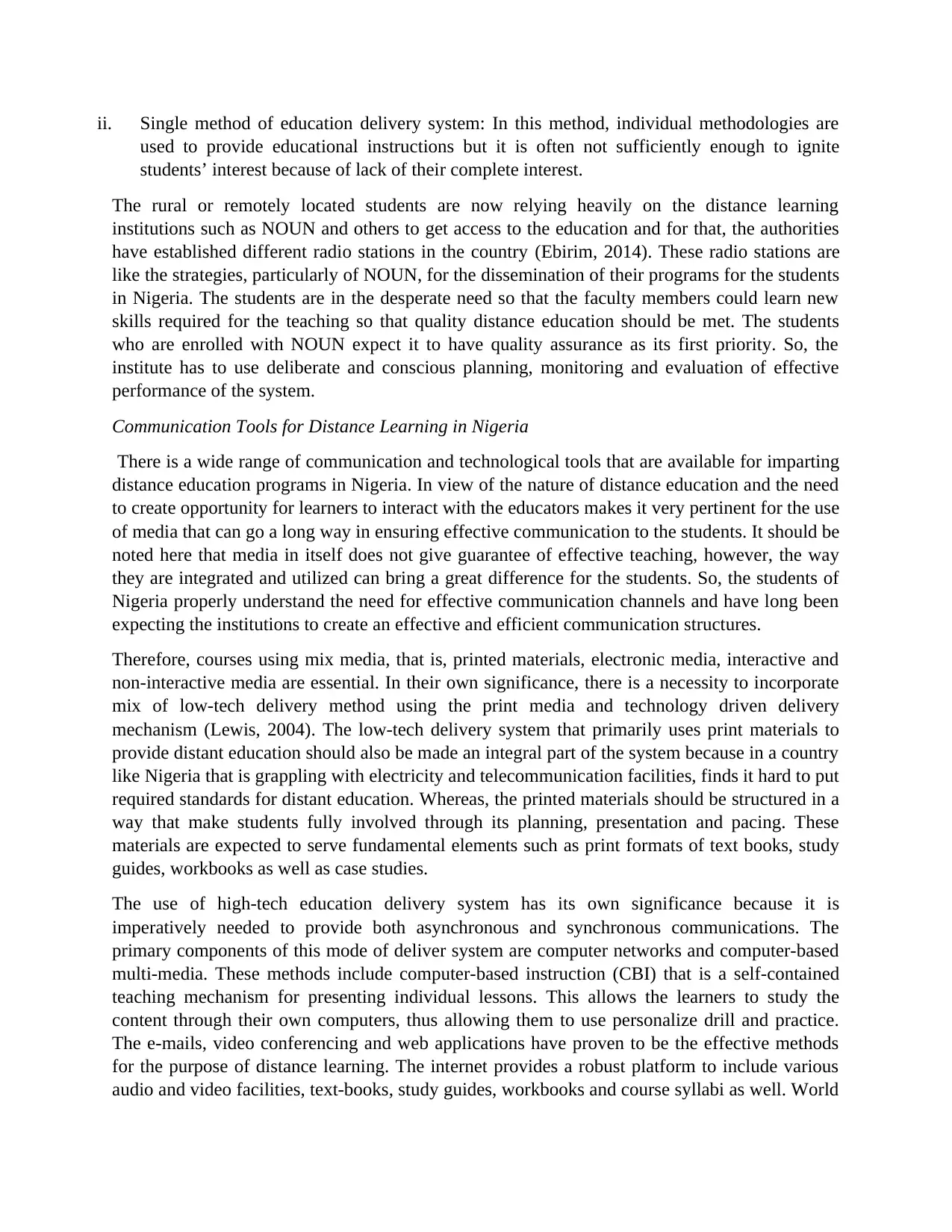
ii. Single method of education delivery system: In this method, individual methodologies are
used to provide educational instructions but it is often not sufficiently enough to ignite
students’ interest because of lack of their complete interest.
The rural or remotely located students are now relying heavily on the distance learning
institutions such as NOUN and others to get access to the education and for that, the authorities
have established different radio stations in the country (Ebirim, 2014). These radio stations are
like the strategies, particularly of NOUN, for the dissemination of their programs for the students
in Nigeria. The students are in the desperate need so that the faculty members could learn new
skills required for the teaching so that quality distance education should be met. The students
who are enrolled with NOUN expect it to have quality assurance as its first priority. So, the
institute has to use deliberate and conscious planning, monitoring and evaluation of effective
performance of the system.
Communication Tools for Distance Learning in Nigeria
There is a wide range of communication and technological tools that are available for imparting
distance education programs in Nigeria. In view of the nature of distance education and the need
to create opportunity for learners to interact with the educators makes it very pertinent for the use
of media that can go a long way in ensuring effective communication to the students. It should be
noted here that media in itself does not give guarantee of effective teaching, however, the way
they are integrated and utilized can bring a great difference for the students. So, the students of
Nigeria properly understand the need for effective communication channels and have long been
expecting the institutions to create an effective and efficient communication structures.
Therefore, courses using mix media, that is, printed materials, electronic media, interactive and
non-interactive media are essential. In their own significance, there is a necessity to incorporate
mix of low-tech delivery method using the print media and technology driven delivery
mechanism (Lewis, 2004). The low-tech delivery system that primarily uses print materials to
provide distant education should also be made an integral part of the system because in a country
like Nigeria that is grappling with electricity and telecommunication facilities, finds it hard to put
required standards for distant education. Whereas, the printed materials should be structured in a
way that make students fully involved through its planning, presentation and pacing. These
materials are expected to serve fundamental elements such as print formats of text books, study
guides, workbooks as well as case studies.
The use of high-tech education delivery system has its own significance because it is
imperatively needed to provide both asynchronous and synchronous communications. The
primary components of this mode of deliver system are computer networks and computer-based
multi-media. These methods include computer-based instruction (CBI) that is a self-contained
teaching mechanism for presenting individual lessons. This allows the learners to study the
content through their own computers, thus allowing them to use personalize drill and practice.
The e-mails, video conferencing and web applications have proven to be the effective methods
for the purpose of distance learning. The internet provides a robust platform to include various
audio and video facilities, text-books, study guides, workbooks and course syllabi as well. World
used to provide educational instructions but it is often not sufficiently enough to ignite
students’ interest because of lack of their complete interest.
The rural or remotely located students are now relying heavily on the distance learning
institutions such as NOUN and others to get access to the education and for that, the authorities
have established different radio stations in the country (Ebirim, 2014). These radio stations are
like the strategies, particularly of NOUN, for the dissemination of their programs for the students
in Nigeria. The students are in the desperate need so that the faculty members could learn new
skills required for the teaching so that quality distance education should be met. The students
who are enrolled with NOUN expect it to have quality assurance as its first priority. So, the
institute has to use deliberate and conscious planning, monitoring and evaluation of effective
performance of the system.
Communication Tools for Distance Learning in Nigeria
There is a wide range of communication and technological tools that are available for imparting
distance education programs in Nigeria. In view of the nature of distance education and the need
to create opportunity for learners to interact with the educators makes it very pertinent for the use
of media that can go a long way in ensuring effective communication to the students. It should be
noted here that media in itself does not give guarantee of effective teaching, however, the way
they are integrated and utilized can bring a great difference for the students. So, the students of
Nigeria properly understand the need for effective communication channels and have long been
expecting the institutions to create an effective and efficient communication structures.
Therefore, courses using mix media, that is, printed materials, electronic media, interactive and
non-interactive media are essential. In their own significance, there is a necessity to incorporate
mix of low-tech delivery method using the print media and technology driven delivery
mechanism (Lewis, 2004). The low-tech delivery system that primarily uses print materials to
provide distant education should also be made an integral part of the system because in a country
like Nigeria that is grappling with electricity and telecommunication facilities, finds it hard to put
required standards for distant education. Whereas, the printed materials should be structured in a
way that make students fully involved through its planning, presentation and pacing. These
materials are expected to serve fundamental elements such as print formats of text books, study
guides, workbooks as well as case studies.
The use of high-tech education delivery system has its own significance because it is
imperatively needed to provide both asynchronous and synchronous communications. The
primary components of this mode of deliver system are computer networks and computer-based
multi-media. These methods include computer-based instruction (CBI) that is a self-contained
teaching mechanism for presenting individual lessons. This allows the learners to study the
content through their own computers, thus allowing them to use personalize drill and practice.
The e-mails, video conferencing and web applications have proven to be the effective methods
for the purpose of distance learning. The internet provides a robust platform to include various
audio and video facilities, text-books, study guides, workbooks and course syllabi as well. World
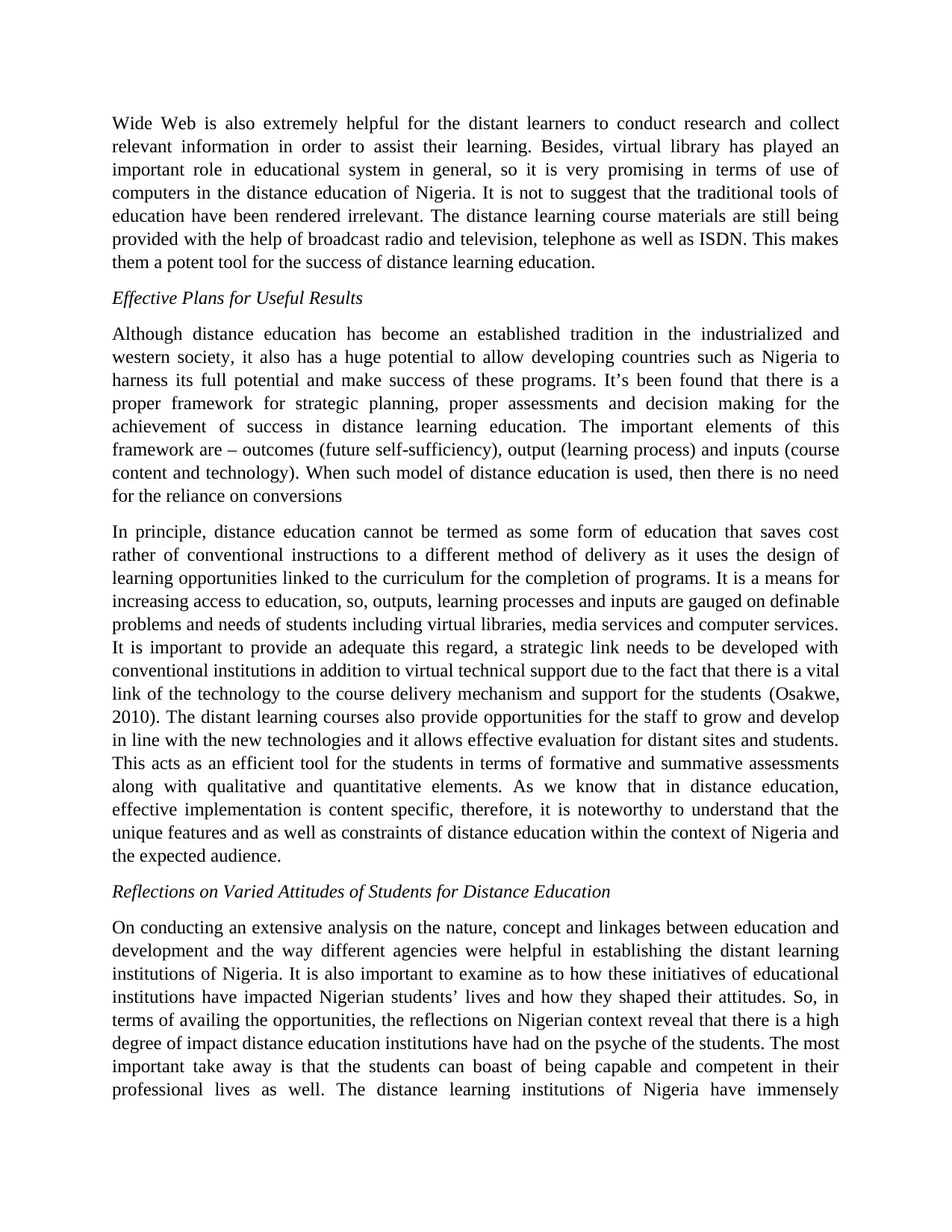
Wide Web is also extremely helpful for the distant learners to conduct research and collect
relevant information in order to assist their learning. Besides, virtual library has played an
important role in educational system in general, so it is very promising in terms of use of
computers in the distance education of Nigeria. It is not to suggest that the traditional tools of
education have been rendered irrelevant. The distance learning course materials are still being
provided with the help of broadcast radio and television, telephone as well as ISDN. This makes
them a potent tool for the success of distance learning education.
Effective Plans for Useful Results
Although distance education has become an established tradition in the industrialized and
western society, it also has a huge potential to allow developing countries such as Nigeria to
harness its full potential and make success of these programs. It’s been found that there is a
proper framework for strategic planning, proper assessments and decision making for the
achievement of success in distance learning education. The important elements of this
framework are – outcomes (future self-sufficiency), output (learning process) and inputs (course
content and technology). When such model of distance education is used, then there is no need
for the reliance on conversions
In principle, distance education cannot be termed as some form of education that saves cost
rather of conventional instructions to a different method of delivery as it uses the design of
learning opportunities linked to the curriculum for the completion of programs. It is a means for
increasing access to education, so, outputs, learning processes and inputs are gauged on definable
problems and needs of students including virtual libraries, media services and computer services.
It is important to provide an adequate this regard, a strategic link needs to be developed with
conventional institutions in addition to virtual technical support due to the fact that there is a vital
link of the technology to the course delivery mechanism and support for the students (Osakwe,
2010). The distant learning courses also provide opportunities for the staff to grow and develop
in line with the new technologies and it allows effective evaluation for distant sites and students.
This acts as an efficient tool for the students in terms of formative and summative assessments
along with qualitative and quantitative elements. As we know that in distance education,
effective implementation is content specific, therefore, it is noteworthy to understand that the
unique features and as well as constraints of distance education within the context of Nigeria and
the expected audience.
Reflections on Varied Attitudes of Students for Distance Education
On conducting an extensive analysis on the nature, concept and linkages between education and
development and the way different agencies were helpful in establishing the distant learning
institutions of Nigeria. It is also important to examine as to how these initiatives of educational
institutions have impacted Nigerian students’ lives and how they shaped their attitudes. So, in
terms of availing the opportunities, the reflections on Nigerian context reveal that there is a high
degree of impact distance education institutions have had on the psyche of the students. The most
important take away is that the students can boast of being capable and competent in their
professional lives as well. The distance learning institutions of Nigeria have immensely
relevant information in order to assist their learning. Besides, virtual library has played an
important role in educational system in general, so it is very promising in terms of use of
computers in the distance education of Nigeria. It is not to suggest that the traditional tools of
education have been rendered irrelevant. The distance learning course materials are still being
provided with the help of broadcast radio and television, telephone as well as ISDN. This makes
them a potent tool for the success of distance learning education.
Effective Plans for Useful Results
Although distance education has become an established tradition in the industrialized and
western society, it also has a huge potential to allow developing countries such as Nigeria to
harness its full potential and make success of these programs. It’s been found that there is a
proper framework for strategic planning, proper assessments and decision making for the
achievement of success in distance learning education. The important elements of this
framework are – outcomes (future self-sufficiency), output (learning process) and inputs (course
content and technology). When such model of distance education is used, then there is no need
for the reliance on conversions
In principle, distance education cannot be termed as some form of education that saves cost
rather of conventional instructions to a different method of delivery as it uses the design of
learning opportunities linked to the curriculum for the completion of programs. It is a means for
increasing access to education, so, outputs, learning processes and inputs are gauged on definable
problems and needs of students including virtual libraries, media services and computer services.
It is important to provide an adequate this regard, a strategic link needs to be developed with
conventional institutions in addition to virtual technical support due to the fact that there is a vital
link of the technology to the course delivery mechanism and support for the students (Osakwe,
2010). The distant learning courses also provide opportunities for the staff to grow and develop
in line with the new technologies and it allows effective evaluation for distant sites and students.
This acts as an efficient tool for the students in terms of formative and summative assessments
along with qualitative and quantitative elements. As we know that in distance education,
effective implementation is content specific, therefore, it is noteworthy to understand that the
unique features and as well as constraints of distance education within the context of Nigeria and
the expected audience.
Reflections on Varied Attitudes of Students for Distance Education
On conducting an extensive analysis on the nature, concept and linkages between education and
development and the way different agencies were helpful in establishing the distant learning
institutions of Nigeria. It is also important to examine as to how these initiatives of educational
institutions have impacted Nigerian students’ lives and how they shaped their attitudes. So, in
terms of availing the opportunities, the reflections on Nigerian context reveal that there is a high
degree of impact distance education institutions have had on the psyche of the students. The most
important take away is that the students can boast of being capable and competent in their
professional lives as well. The distance learning institutions of Nigeria have immensely
Secure Best Marks with AI Grader
Need help grading? Try our AI Grader for instant feedback on your assignments.
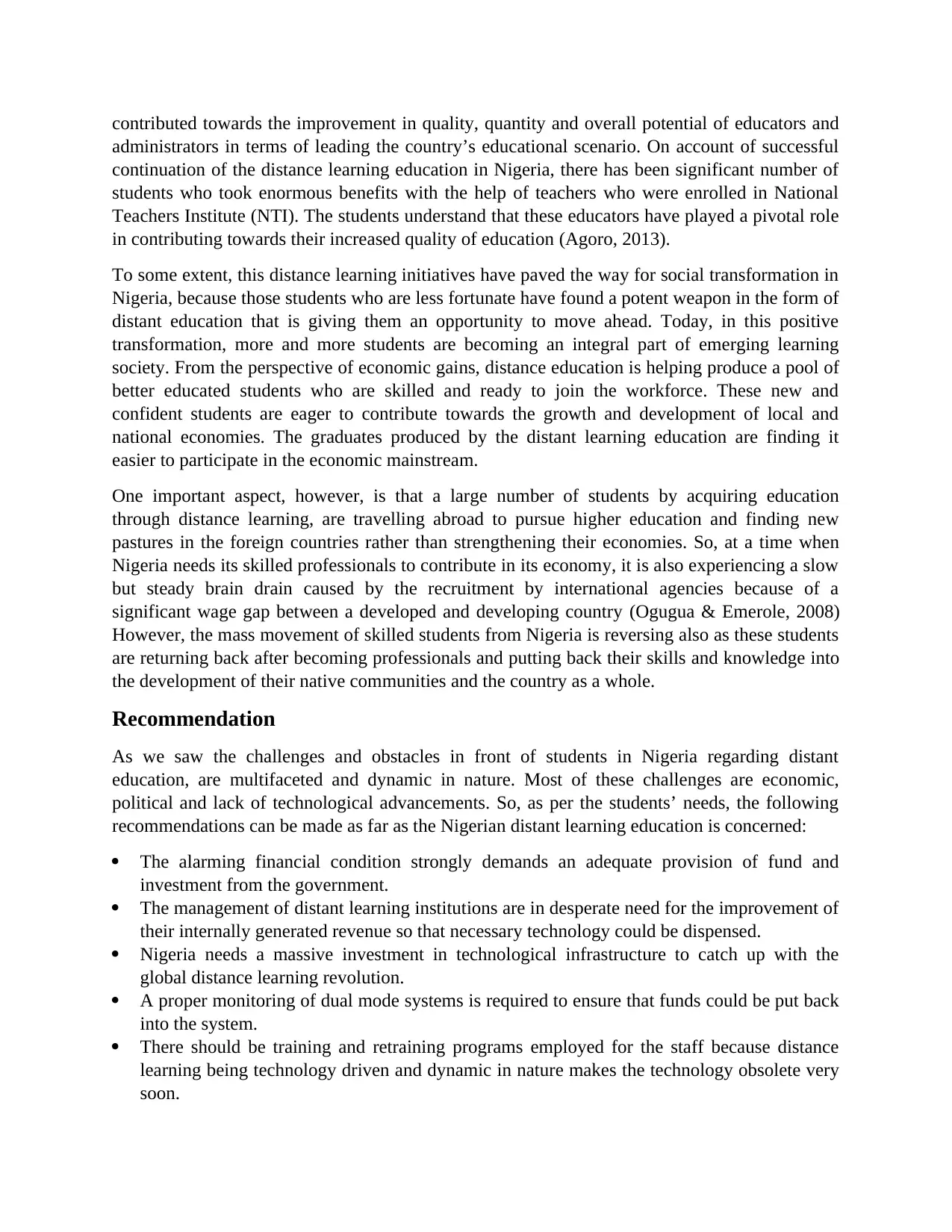
contributed towards the improvement in quality, quantity and overall potential of educators and
administrators in terms of leading the country’s educational scenario. On account of successful
continuation of the distance learning education in Nigeria, there has been significant number of
students who took enormous benefits with the help of teachers who were enrolled in National
Teachers Institute (NTI). The students understand that these educators have played a pivotal role
in contributing towards their increased quality of education (Agoro, 2013).
To some extent, this distance learning initiatives have paved the way for social transformation in
Nigeria, because those students who are less fortunate have found a potent weapon in the form of
distant education that is giving them an opportunity to move ahead. Today, in this positive
transformation, more and more students are becoming an integral part of emerging learning
society. From the perspective of economic gains, distance education is helping produce a pool of
better educated students who are skilled and ready to join the workforce. These new and
confident students are eager to contribute towards the growth and development of local and
national economies. The graduates produced by the distant learning education are finding it
easier to participate in the economic mainstream.
One important aspect, however, is that a large number of students by acquiring education
through distance learning, are travelling abroad to pursue higher education and finding new
pastures in the foreign countries rather than strengthening their economies. So, at a time when
Nigeria needs its skilled professionals to contribute in its economy, it is also experiencing a slow
but steady brain drain caused by the recruitment by international agencies because of a
significant wage gap between a developed and developing country (Ogugua & Emerole, 2008)
However, the mass movement of skilled students from Nigeria is reversing also as these students
are returning back after becoming professionals and putting back their skills and knowledge into
the development of their native communities and the country as a whole.
Recommendation
As we saw the challenges and obstacles in front of students in Nigeria regarding distant
education, are multifaceted and dynamic in nature. Most of these challenges are economic,
political and lack of technological advancements. So, as per the students’ needs, the following
recommendations can be made as far as the Nigerian distant learning education is concerned:
The alarming financial condition strongly demands an adequate provision of fund and
investment from the government.
The management of distant learning institutions are in desperate need for the improvement of
their internally generated revenue so that necessary technology could be dispensed.
Nigeria needs a massive investment in technological infrastructure to catch up with the
global distance learning revolution.
A proper monitoring of dual mode systems is required to ensure that funds could be put back
into the system.
There should be training and retraining programs employed for the staff because distance
learning being technology driven and dynamic in nature makes the technology obsolete very
soon.
administrators in terms of leading the country’s educational scenario. On account of successful
continuation of the distance learning education in Nigeria, there has been significant number of
students who took enormous benefits with the help of teachers who were enrolled in National
Teachers Institute (NTI). The students understand that these educators have played a pivotal role
in contributing towards their increased quality of education (Agoro, 2013).
To some extent, this distance learning initiatives have paved the way for social transformation in
Nigeria, because those students who are less fortunate have found a potent weapon in the form of
distant education that is giving them an opportunity to move ahead. Today, in this positive
transformation, more and more students are becoming an integral part of emerging learning
society. From the perspective of economic gains, distance education is helping produce a pool of
better educated students who are skilled and ready to join the workforce. These new and
confident students are eager to contribute towards the growth and development of local and
national economies. The graduates produced by the distant learning education are finding it
easier to participate in the economic mainstream.
One important aspect, however, is that a large number of students by acquiring education
through distance learning, are travelling abroad to pursue higher education and finding new
pastures in the foreign countries rather than strengthening their economies. So, at a time when
Nigeria needs its skilled professionals to contribute in its economy, it is also experiencing a slow
but steady brain drain caused by the recruitment by international agencies because of a
significant wage gap between a developed and developing country (Ogugua & Emerole, 2008)
However, the mass movement of skilled students from Nigeria is reversing also as these students
are returning back after becoming professionals and putting back their skills and knowledge into
the development of their native communities and the country as a whole.
Recommendation
As we saw the challenges and obstacles in front of students in Nigeria regarding distant
education, are multifaceted and dynamic in nature. Most of these challenges are economic,
political and lack of technological advancements. So, as per the students’ needs, the following
recommendations can be made as far as the Nigerian distant learning education is concerned:
The alarming financial condition strongly demands an adequate provision of fund and
investment from the government.
The management of distant learning institutions are in desperate need for the improvement of
their internally generated revenue so that necessary technology could be dispensed.
Nigeria needs a massive investment in technological infrastructure to catch up with the
global distance learning revolution.
A proper monitoring of dual mode systems is required to ensure that funds could be put back
into the system.
There should be training and retraining programs employed for the staff because distance
learning being technology driven and dynamic in nature makes the technology obsolete very
soon.
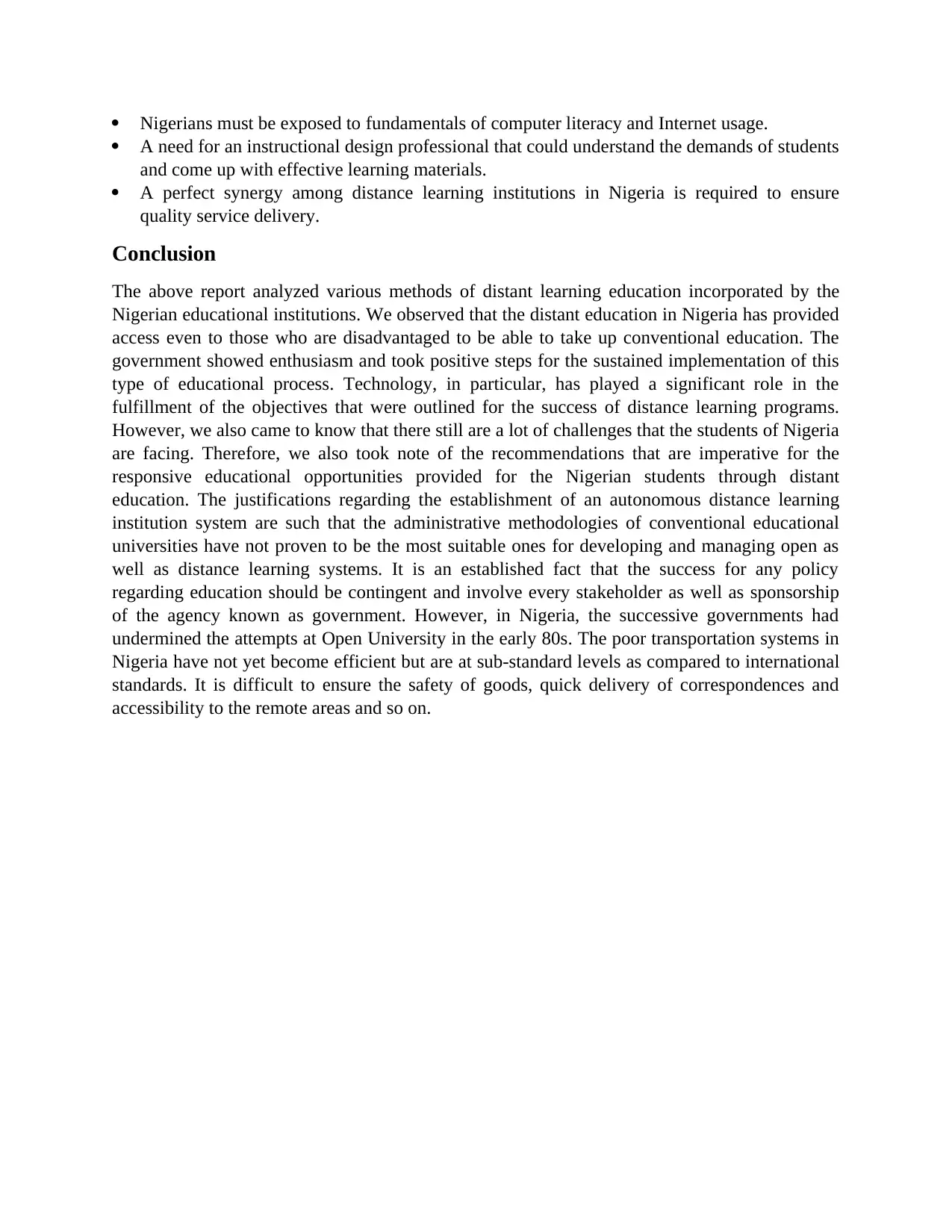
Nigerians must be exposed to fundamentals of computer literacy and Internet usage.
A need for an instructional design professional that could understand the demands of students
and come up with effective learning materials.
A perfect synergy among distance learning institutions in Nigeria is required to ensure
quality service delivery.
Conclusion
The above report analyzed various methods of distant learning education incorporated by the
Nigerian educational institutions. We observed that the distant education in Nigeria has provided
access even to those who are disadvantaged to be able to take up conventional education. The
government showed enthusiasm and took positive steps for the sustained implementation of this
type of educational process. Technology, in particular, has played a significant role in the
fulfillment of the objectives that were outlined for the success of distance learning programs.
However, we also came to know that there still are a lot of challenges that the students of Nigeria
are facing. Therefore, we also took note of the recommendations that are imperative for the
responsive educational opportunities provided for the Nigerian students through distant
education. The justifications regarding the establishment of an autonomous distance learning
institution system are such that the administrative methodologies of conventional educational
universities have not proven to be the most suitable ones for developing and managing open as
well as distance learning systems. It is an established fact that the success for any policy
regarding education should be contingent and involve every stakeholder as well as sponsorship
of the agency known as government. However, in Nigeria, the successive governments had
undermined the attempts at Open University in the early 80s. The poor transportation systems in
Nigeria have not yet become efficient but are at sub-standard levels as compared to international
standards. It is difficult to ensure the safety of goods, quick delivery of correspondences and
accessibility to the remote areas and so on.
A need for an instructional design professional that could understand the demands of students
and come up with effective learning materials.
A perfect synergy among distance learning institutions in Nigeria is required to ensure
quality service delivery.
Conclusion
The above report analyzed various methods of distant learning education incorporated by the
Nigerian educational institutions. We observed that the distant education in Nigeria has provided
access even to those who are disadvantaged to be able to take up conventional education. The
government showed enthusiasm and took positive steps for the sustained implementation of this
type of educational process. Technology, in particular, has played a significant role in the
fulfillment of the objectives that were outlined for the success of distance learning programs.
However, we also came to know that there still are a lot of challenges that the students of Nigeria
are facing. Therefore, we also took note of the recommendations that are imperative for the
responsive educational opportunities provided for the Nigerian students through distant
education. The justifications regarding the establishment of an autonomous distance learning
institution system are such that the administrative methodologies of conventional educational
universities have not proven to be the most suitable ones for developing and managing open as
well as distance learning systems. It is an established fact that the success for any policy
regarding education should be contingent and involve every stakeholder as well as sponsorship
of the agency known as government. However, in Nigeria, the successive governments had
undermined the attempts at Open University in the early 80s. The poor transportation systems in
Nigeria have not yet become efficient but are at sub-standard levels as compared to international
standards. It is difficult to ensure the safety of goods, quick delivery of correspondences and
accessibility to the remote areas and so on.
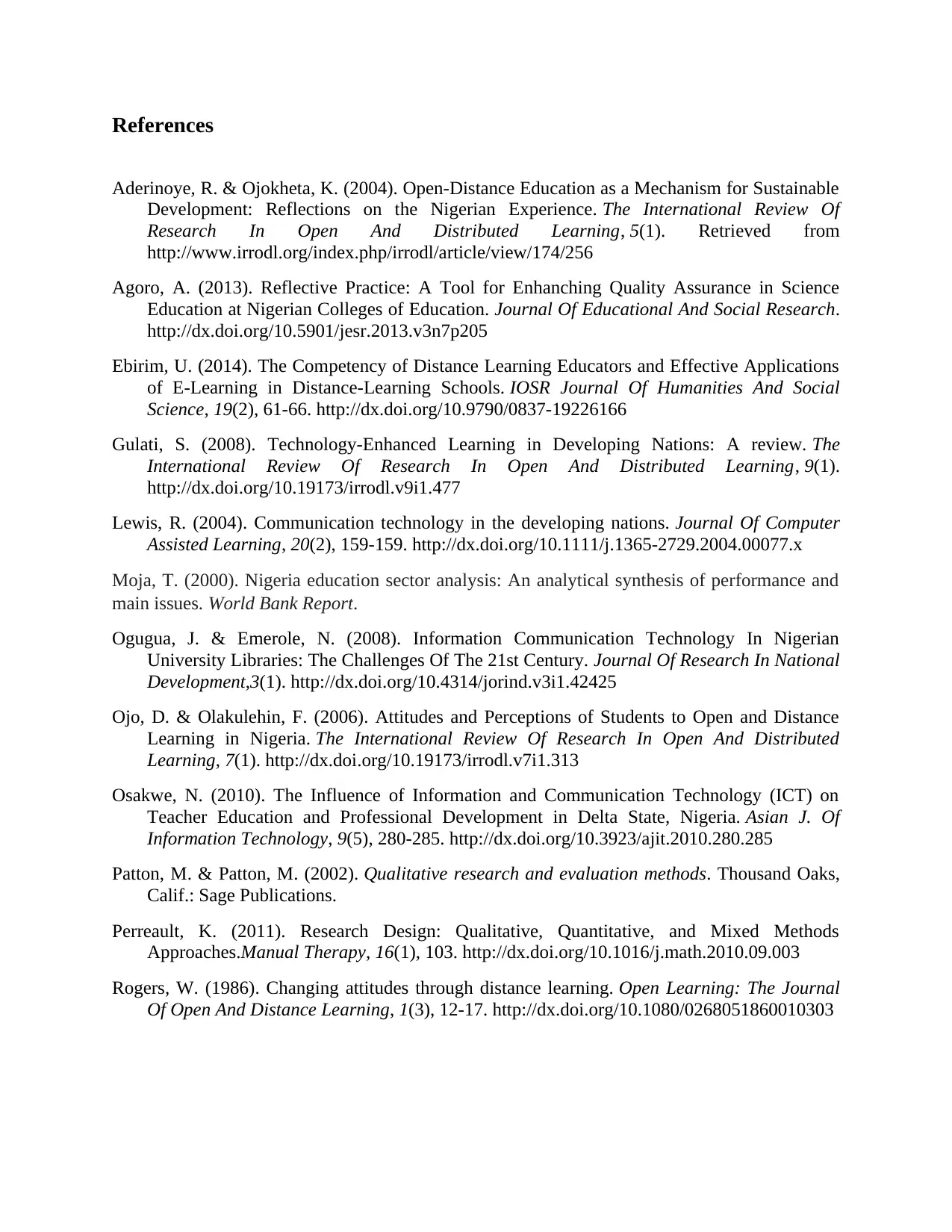
References
Aderinoye, R. & Ojokheta, K. (2004). Open-Distance Education as a Mechanism for Sustainable
Development: Reflections on the Nigerian Experience. The International Review Of
Research In Open And Distributed Learning, 5(1). Retrieved from
http://www.irrodl.org/index.php/irrodl/article/view/174/256
Agoro, A. (2013). Reflective Practice: A Tool for Enhanching Quality Assurance in Science
Education at Nigerian Colleges of Education. Journal Of Educational And Social Research.
http://dx.doi.org/10.5901/jesr.2013.v3n7p205
Ebirim, U. (2014). The Competency of Distance Learning Educators and Effective Applications
of E-Learning in Distance-Learning Schools. IOSR Journal Of Humanities And Social
Science, 19(2), 61-66. http://dx.doi.org/10.9790/0837-19226166
Gulati, S. (2008). Technology-Enhanced Learning in Developing Nations: A review. The
International Review Of Research In Open And Distributed Learning, 9(1).
http://dx.doi.org/10.19173/irrodl.v9i1.477
Lewis, R. (2004). Communication technology in the developing nations. Journal Of Computer
Assisted Learning, 20(2), 159-159. http://dx.doi.org/10.1111/j.1365-2729.2004.00077.x
Moja, T. (2000). Nigeria education sector analysis: An analytical synthesis of performance and
main issues. World Bank Report.
Ogugua, J. & Emerole, N. (2008). Information Communication Technology In Nigerian
University Libraries: The Challenges Of The 21st Century. Journal Of Research In National
Development,3(1). http://dx.doi.org/10.4314/jorind.v3i1.42425
Ojo, D. & Olakulehin, F. (2006). Attitudes and Perceptions of Students to Open and Distance
Learning in Nigeria. The International Review Of Research In Open And Distributed
Learning, 7(1). http://dx.doi.org/10.19173/irrodl.v7i1.313
Osakwe, N. (2010). The Influence of Information and Communication Technology (ICT) on
Teacher Education and Professional Development in Delta State, Nigeria. Asian J. Of
Information Technology, 9(5), 280-285. http://dx.doi.org/10.3923/ajit.2010.280.285
Patton, M. & Patton, M. (2002). Qualitative research and evaluation methods. Thousand Oaks,
Calif.: Sage Publications.
Perreault, K. (2011). Research Design: Qualitative, Quantitative, and Mixed Methods
Approaches.Manual Therapy, 16(1), 103. http://dx.doi.org/10.1016/j.math.2010.09.003
Rogers, W. (1986). Changing attitudes through distance learning. Open Learning: The Journal
Of Open And Distance Learning, 1(3), 12-17. http://dx.doi.org/10.1080/0268051860010303
Aderinoye, R. & Ojokheta, K. (2004). Open-Distance Education as a Mechanism for Sustainable
Development: Reflections on the Nigerian Experience. The International Review Of
Research In Open And Distributed Learning, 5(1). Retrieved from
http://www.irrodl.org/index.php/irrodl/article/view/174/256
Agoro, A. (2013). Reflective Practice: A Tool for Enhanching Quality Assurance in Science
Education at Nigerian Colleges of Education. Journal Of Educational And Social Research.
http://dx.doi.org/10.5901/jesr.2013.v3n7p205
Ebirim, U. (2014). The Competency of Distance Learning Educators and Effective Applications
of E-Learning in Distance-Learning Schools. IOSR Journal Of Humanities And Social
Science, 19(2), 61-66. http://dx.doi.org/10.9790/0837-19226166
Gulati, S. (2008). Technology-Enhanced Learning in Developing Nations: A review. The
International Review Of Research In Open And Distributed Learning, 9(1).
http://dx.doi.org/10.19173/irrodl.v9i1.477
Lewis, R. (2004). Communication technology in the developing nations. Journal Of Computer
Assisted Learning, 20(2), 159-159. http://dx.doi.org/10.1111/j.1365-2729.2004.00077.x
Moja, T. (2000). Nigeria education sector analysis: An analytical synthesis of performance and
main issues. World Bank Report.
Ogugua, J. & Emerole, N. (2008). Information Communication Technology In Nigerian
University Libraries: The Challenges Of The 21st Century. Journal Of Research In National
Development,3(1). http://dx.doi.org/10.4314/jorind.v3i1.42425
Ojo, D. & Olakulehin, F. (2006). Attitudes and Perceptions of Students to Open and Distance
Learning in Nigeria. The International Review Of Research In Open And Distributed
Learning, 7(1). http://dx.doi.org/10.19173/irrodl.v7i1.313
Osakwe, N. (2010). The Influence of Information and Communication Technology (ICT) on
Teacher Education and Professional Development in Delta State, Nigeria. Asian J. Of
Information Technology, 9(5), 280-285. http://dx.doi.org/10.3923/ajit.2010.280.285
Patton, M. & Patton, M. (2002). Qualitative research and evaluation methods. Thousand Oaks,
Calif.: Sage Publications.
Perreault, K. (2011). Research Design: Qualitative, Quantitative, and Mixed Methods
Approaches.Manual Therapy, 16(1), 103. http://dx.doi.org/10.1016/j.math.2010.09.003
Rogers, W. (1986). Changing attitudes through distance learning. Open Learning: The Journal
Of Open And Distance Learning, 1(3), 12-17. http://dx.doi.org/10.1080/0268051860010303
Paraphrase This Document
Need a fresh take? Get an instant paraphrase of this document with our AI Paraphraser

1 out of 11
Related Documents
Your All-in-One AI-Powered Toolkit for Academic Success.
+13062052269
info@desklib.com
Available 24*7 on WhatsApp / Email
![[object Object]](/_next/static/media/star-bottom.7253800d.svg)
Unlock your academic potential
© 2024 | Zucol Services PVT LTD | All rights reserved.





